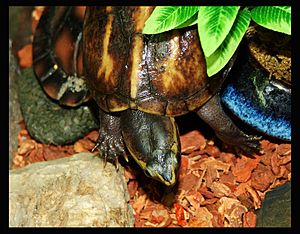Striped mud turtle facts for kids
Quick facts for kids Striped mud turtle |
|
|---|---|
 |
|
| Wild striped mud turtle from Florida | |
| Conservation status | |
| Scientific classification |
|
| Kingdom: | Animalia |
| Phylum: | Chordata |
| Class: | Reptilia |
| Order: | Testudines |
| Suborder: | Cryptodira |
| Family: | Kinosternidae |
| Genus: | Kinosternon |
| Species: |
K. baurii
|
| Binomial name | |
| Kinosternon baurii (Garman, 1891)
|
|
| Script error: The function "autoWithCaption" does not exist. | |
Script error: No such module "Check for conflicting parameters".
The striped mud turtle (Kinosternon baurii) is a type of turtle that lives in the southeastern United States. It belongs to the family called Kinosternidae.
Contents
About the Striped Mud Turtle
The striped mud turtle is easy to spot because it has three light-colored stripes running down its smooth shell, called a carapace. These turtles are usually small, growing to about 8 to 12 centimeters (3 to 4.75 inches) long.
Where They Live
You can find striped mud turtles in several states in the southeastern U.S. They live in Florida, Georgia, North Carolina, South Carolina, and Virginia.
Habitat and Daily Life
These turtles are very common in freshwater places like ponds, swamps, and slow-moving streams. They love to explore on land more than many other mud turtles. Sometimes, you might even see them looking for food in cow pastures!
What They Eat
Striped mud turtles are omnivores, which means they eat both plants and animals. Their diet includes insects, snails, fish, and even dead animals (carrion). They also munch on algae and other plants. Sometimes, they eat dried krill too.
Reproduction and Life Cycle
Female striped mud turtles lay their eggs between September and June. The eggs are a little over 2.5 centimeters (1 inch) long. After about 13 to 19 weeks, the baby turtles hatch. These hatchlings are tiny, only about 2.5 centimeters (1 inch) long. Unlike the adults, their shells have a small ridge, or "keel," when they are young.
Striped Mud Turtles as Pets
If you're thinking about a pet turtle, the striped mud turtle can be a good choice because they are fairly easy to care for. They readily eat commercial turtle food, small feeder fish, and worms.
See also
 In Spanish: Tortuga de pantano rayada para niños
In Spanish: Tortuga de pantano rayada para niños
 | Jessica Watkins |
 | Robert Henry Lawrence Jr. |
 | Mae Jemison |
 | Sian Proctor |
 | Guion Bluford |


